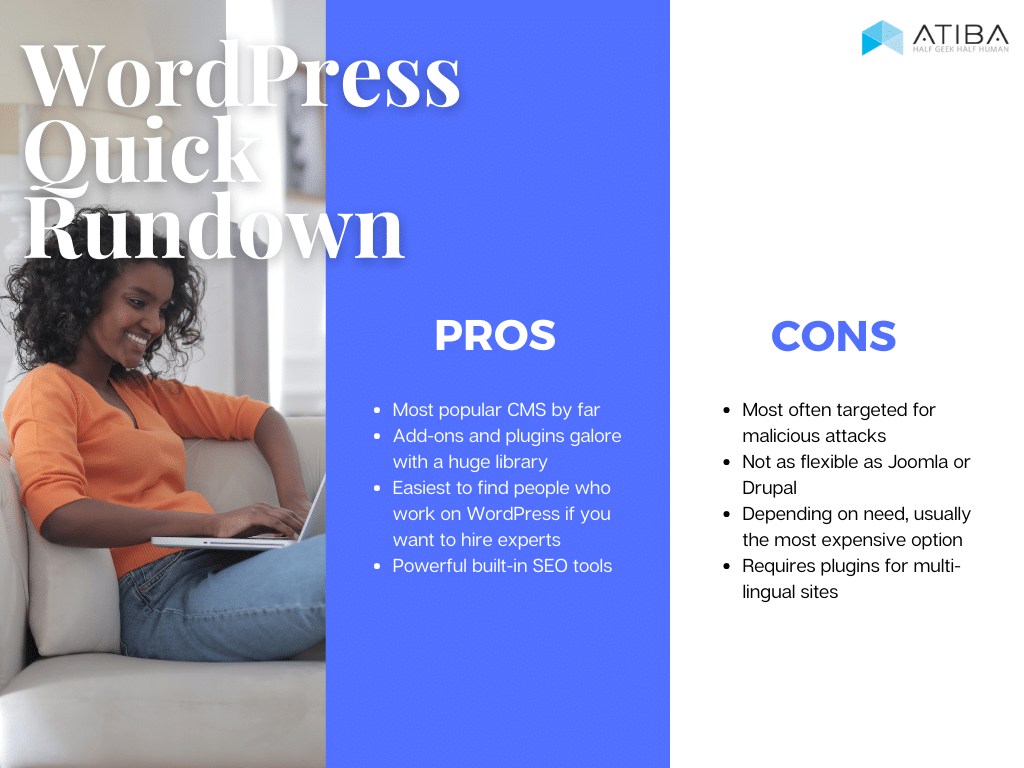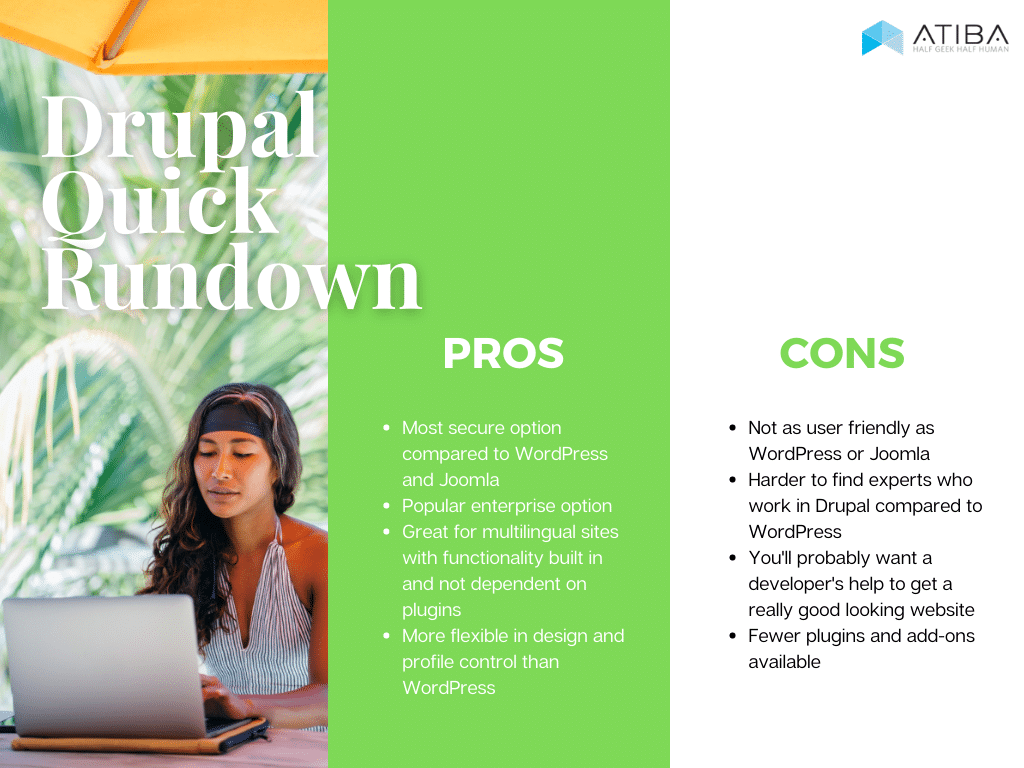There’s so much to consider when trying to find the right CMS platform for your website. Let’s start by defining the CMS platform. CMS stands for “content management system”. It’s the program you’ll use to create and manage your website. Today, we’re going to talk about the three leading CMS platforms that are out there: WordPress, Joomla, and Drupal.
They’ve all been around for quite some time and all offer unique features and traits to their users. While WordPress is by far the most popular platform, it might not be the best for you. Joomla and Drupal are both fantastic CMS platforms that offer the right users powerful, flexible, and secure options for web development. They both hold consistent market share and don’t show signs of fading away.
And while it seems like there’s not much space below those two platforms, there are dozens of dozens of other platform companies who’d love the foothold Joomla and Drupal hold. While we’d love to look at all of those today, we’re just going to stick to the top three.
Let’s jump in and talk about what’s great and not great about each platform.
Why WordPress?

Even if you’re new to web design and development, you’ve no doubt heard of WordPress. Many consider it to be the Coke or Kleenex of the CMS world. How did it get to be so popular?
It’s Easier to Find WordPress Experts
First, it’s popular because it’s popular. Brand recognition goes a long way. What do I mean by that?
Well, if you need someone to work on your website, it’s going to be much easier to find someone who works on WordPress because developers are more likely to be familiar with WordPress and its inner workings. When something is as well-known and used as WordPress is, it’s bound to attract more talent. So the fact that lots of people use it and know how to support it makes it all the more popular choice for folks looking for a platform.
It’s Easy to Use
When it comes to learning the ins and outs, WordPress makes it easy for its users. There are still plenty of tools and tricks you’ll have to learn, it has the easiest learning curve out there. You don’t have to have an ounce of coding or programming knowledge in order to become a WordPress wiz. And because it’s so popular, there are plenty of places online to help you.
There are lots of forums, YouTube channels, and questions already answered online to help you get started.
More SEO-Friendly
SEO, or search engine optimization, is the practice of making sure your site appears at the top of search results. WordPress makes it much easier to make your site SEO-friendly through various tools and plugins.
Lots of Plugins
With more tools, plugins, and add-ons than the competition, WordPress stole the “there’s an app for that” from the iPhone and changed it to “there’s a plugin for that”. There’s everything from SEO assistant tools to structured data tools to even a plugin that will spout out Dolly Parton quotes.
WordPress is designed to help you create a successful and attractive website. While WordPress isn’t as flexible or customizable as its competition, it makes up for that by offering a wide variety of plugins and tools. It’s a trade-off of custom vs semi-custom but for many users (especially those who don’t have the knowledge to code custom anyway) it’s a great solution.
Bundles of Templates
While all of those tools are great, you won’t actually get to make the most of them if you don’t have a good-looking website.
Luckily for you, WordPress is packed with loads of templates, both free and paid, that will give the website the look you’re looking for. The handy-dandy search option will help you sort and filter by theme and style. Plus, many of these free themes have customizable options so you can play with the color scheme, font, and more.
Why Not WordPress?
We’ve sung the praises of WordPress long enough, but why are people choosing other CMS platforms? There are some solid reasons people don’t choose WordPress.
Not as Customizable as Many Would Like
You can do a lot to make a powerful, strong brand on WordPress. But you’ll never have the freedom you’d get from Drupal or Joomla. You’ll always be reliant on templates, plugins, and add-ons. And while those libraries and options are enormous and available to all users, they can be rather limited. Plus, many plug-ins may not be compatible with certain themes, especially if you go about and build your own.
So while you can build the website of your dreams, the reality is it could end up looking a lot like someone else’s dream, too. So if being truly custom is important to you, it’s probably best to consider Drupal or Joomla.
Big Targets Are Easy to See & Even Easier to Hit
Hackers and criminals know that the best bang for their buck is to target as many sites as possible. So when they look for a target, they look for platforms that are popular. Since WordPress has significantly more users than Joomla or Drupal, it’s frequently more targeted.
In fact, one report found that in 2016 WordPress accounted for 76% of all infected platforms. It isn’t that WordPress doesn’t have security features as robust as the other platforms, but because of their size and the realities of allowing third party access (AKA plugins), there’s a lot for a hacker to gain and several doorways to try picking to get through.
It Can be Expensive
OK, so while all three platforms are technically free, if you really want an attractive and powerful website, you’ll discover pretty quickly that free is cheap and good comes at a cost. You need your own hosted site that’s not only going to look good to customers but will rank better on Google and load faster too.
Premium versions of plugins and add-ons can rack up a cost quickly. And since WordPress relies on those more than Joomla or Drupal which rely more on coding, getting the functionality and presentation you want for your site could be expensive. Of course, this depends on what you want and need on your site. But it’s a good rule of thumb to expect that the more you want the more you’ll spend.
Why Joomla?

The Right Mix of Freedom And Hand Holding
In so many ways, Joomla is a middle ground between WordPress and Drupal. If you’re comfortable doing some programming, it can be more customizable than Joomla. But if you’re not a strong programmer, there’s a bit of a learning curve to implementing templates and other add-ons.
If you think you’re up for some challenge but you want a safety net, Joomla might be a good option for you.
Flexible for Various Types of Content
If you’re looking at developing a site that doesn’t have the traditional forms of content, then Joomla may be for you. One of its specialties is displaying and customizing your non-standard types of content.
Stronger Multilingual Support
While WordPress requires a third-party plugin to support other languages, Joomla comes right out of the box with multilingual support. This is especially helpful if you’re running an eCommerce store in multiple countries or have an audience spread around the globe.
Why Not Joomla?
The Middle Doesn’t Win or Lose
Although Joomla gives you some of what WordPress offers and some of what Drupal offers, it doesn’t really give you the best option on anything. We can call it the “master of none”.
It’s not as secure as Drupal, not as easy to use as WordPress, nor very popular with developers, making it hard to find help. While the middle ground means you don’t lose at anything, you don’t win either.
Many users feel like if they need programming knowledge to get started, so you might as well bite the bullet and go with Drupal to get the benefits of great security and customization. Those who don’t feel like they want to bother with programming or coding revert back to WordPress.
Why Drupal?

Optimal Security
There’s a reason Drupal is a popular choice for The New Yorker, Whitehouse.gov, and Mercedes Benz. It’s the Fort Knox of the three platforms.
In the same report that listed WordPress as accounting for 76% of all infected websites, Drupal accounted for only 2%. This puts it way above the competition when it comes to security. In fact, it even beat Joomla by double digits who accounted for 14% of all attacks.
You Can Build What You Want…If You Know How
There is tremendous flexibility in how you build sites in Drupal. The downside is, you have to know some coding. And by some, we need a lot. Your first rodeo shouldn’t be with Drupal.
That said, if you want a really custom site, Drupal is a great place to do it. Since there’s more flexibility in how you can code your site, getting customized features and functionality can be accomplished through code instead of plugins or add-ons.
Why Not Drupal?
A Learning Curve You Need Climbing Gear to Conquer
Drupal is notoriously the most difficult platform to use as a beginner and relies heavily on the user having some, if not a lot, of programming knowledge. It leaves many users dependent on help from contractors or dedicating an employee to the development and management of the site. While that heavy dependence on programming acumen can seem discouraging, remember, it means the ability for greater customization. Just be aware that customization requires programming knowledge which could mean a lag in finding the talent you need. Speaking of talent…
Your Calls For Help Might Echo
Because Drupal is less popular than the other two platforms, many users who want to hire help might struggle to find someone who can actually do the work. There isn’t a huge pool of developers who are experienced in Drupal.
And since Drupal requires a good bit of programming experience and suffers a serious learning curve, make sure you know someone who is available and willing to help you if you need it before you embark on creating your secure, custom Drupal site.
Conclusion
In the end, choosing which platform works best for you might be more about who you are than what they offer. What kinds of challenges are you ready to tackle, and what service is the best platform for your business? While it’s tempting to say WordPress or Drupal are the two best options, Joomla still has its rightful place in the CMS world. Taking the time to investigate options and asking yourself what you really need and want from a platform is the best first step.
While the decision on which of the three is tough, the good news is there are lots of experts who can help you choose which platform to use, or migrate you if you change your mind later. Here at Atiba, we have experts who are familiar with WordPress, Joomla, and Drupal. We have an experienced team ready to help you choose the platform for you and help you when you need it.
Atiba has a team of experience CMS website design experts delivering our web design and development services. Contact us today to speak to one of our experts about your project.
* Market Share results from W3 Techs Web Technology Surveys website that’s updated daily. All results cited in this post were pulled from the Usage Statistics of Content Management Systems Report on September 30, 2020.
Additional Reading:
